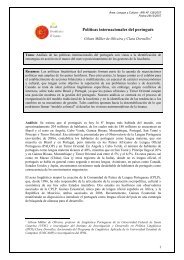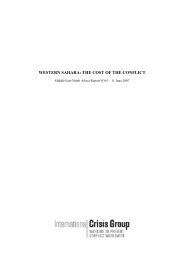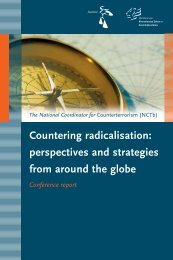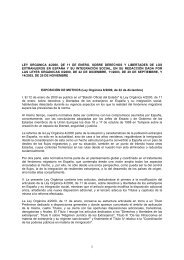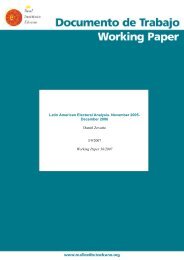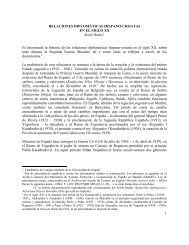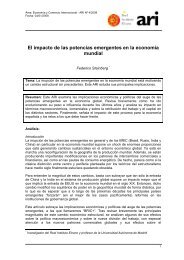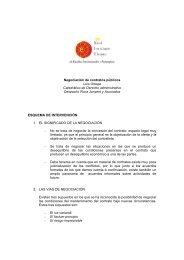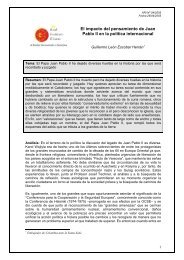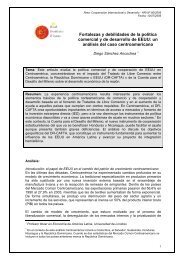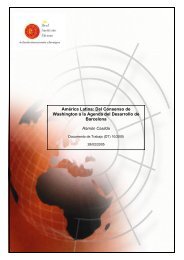Spain and the United States - Real Instituto Elcano
Spain and the United States - Real Instituto Elcano
Spain and the United States - Real Instituto Elcano
You also want an ePaper? Increase the reach of your titles
YUMPU automatically turns print PDFs into web optimized ePapers that Google loves.
OVERVIEW 41<br />
magnitude needed in a “pacifist” society like <strong>Spain</strong>’s. One reason for <strong>Spain</strong>’s<br />
pacifism is <strong>the</strong> trauma of its 1936-39 Civil War, which is embedded in <strong>the</strong><br />
collective memory.<br />
The gulf between American <strong>and</strong> Spanish public opinion was underscored<br />
by <strong>the</strong> German Marshall Fund’s 2004 poll of <strong>the</strong> <strong>United</strong> <strong>States</strong> <strong>and</strong><br />
eight European countries. To <strong>the</strong> question “Under some conditions, war is<br />
necessary to obtain justice” 82% of Americans responded ‘yes’, while only<br />
25% of Spaniards (<strong>the</strong> lowest number of all <strong>the</strong> countries polled) answered in<br />
<strong>the</strong> affirmative. The question did not refer to any particular war, such as <strong>the</strong><br />
Iraq War or <strong>the</strong> Vietnam War, but to war in general. “Setting aside who is right<br />
or wrong, we are facing an enormous gap in perspective which transcends<br />
individual politicians <strong>and</strong> which we have to deal with,” said Robert Kagan, a<br />
columnist <strong>and</strong> senior associate at <strong>the</strong> Carnegie Endowment for International<br />
Peace. 41 A majority (74%) supported <strong>the</strong> government’s decision to withdraw<br />
Spanish troops from Iraq <strong>and</strong> 66% supported deploying <strong>the</strong> troops in Iraq if <strong>the</strong><br />
<strong>United</strong> Nations approved a multinational force to assist with security <strong>and</strong><br />
reconstruction. Support, however, fell if such a multinational force were to be<br />
under US comm<strong>and</strong>.<br />
Zapatero’s withdrawal of troops from Iraq caused a major st<strong>and</strong>-off with<br />
<strong>the</strong> Bush administration, which relegated <strong>Spain</strong> to <strong>the</strong> status of an “unreliable<br />
ally” (<strong>the</strong> word “traitor” was used in some quarters). Many American<br />
commentators <strong>and</strong> some legislators, including Dennis Hastert, <strong>the</strong> most senior<br />
Republican in <strong>the</strong> US Congress, as well as Richard Myers, <strong>the</strong> Joint Chiefs of<br />
Staff Chairman, directly or indirectly accused <strong>the</strong> Spanish people of appeasing<br />
terrorists on <strong>the</strong> grounds that <strong>the</strong>y had given into <strong>the</strong>m by throwing out a party<br />
whose leader had stood shoulder to shoulder with <strong>the</strong> Bush administration in<br />
its fight against global terrorism. This was a very simplistic interpretation of<br />
what happened in <strong>Spain</strong> between <strong>the</strong> bombs <strong>and</strong> <strong>the</strong> elections <strong>and</strong> deeply<br />
offended many Spaniards who are no strangers to terrorism. 42 The Socialists<br />
became <strong>the</strong> whipping boy for <strong>the</strong> White House’s frustrations with “Old<br />
Europe”, as <strong>the</strong> US Defence Secretary Donald Rumsfeld once labelled<br />
Germany <strong>and</strong> France (who also opposed <strong>the</strong> war with Iraq). It was an easy<br />
target, as <strong>the</strong> cost of <strong>the</strong> friction with <strong>Spain</strong>, unlike with France or Germany,<br />
was zero or very little. What particularly annoyed <strong>the</strong> White House was not so<br />
much <strong>the</strong> pull-out of troops but <strong>the</strong> sudden way in which it was done <strong>and</strong><br />
41. See www.realinstitutoelcano.org/publicaciones/libros/seminario_usa.pdf.<br />
42. See <strong>the</strong> much more balanced testimony of Robin Niblett, executive vice-president <strong>and</strong> senior fellow,<br />
Europe Programme, Centre for Strategic & International Studies, before <strong>the</strong> Committee on Foreign Relations,<br />
Subcommittee on European Affairs, on March 31, 2004 (http://foreign.senate.gov/testimony/2004/Niblett<br />
Testimony040331.pdf).



